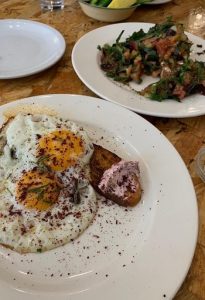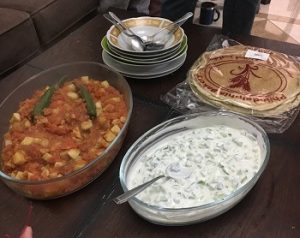Written by Cecilia Beard, (University of North Carolina – Chapel Hill) Student Correspondent CET Jordan: Intensive Language Spring 2019
Before coming to Amman, I’d been vegetarian for almost ten years. At the age of eleven, after coming home from a friend’s house who happened to not eat meat, I decided that chicken was strange, I didn’t want to eat cows, and most importantly, I wanted to be exactly like said friend. Despite my perhaps uninformed initial reasons for becoming vegetarian, my reasoning has since evolved to include global sustainability and my general health.

I planned to continue my vegetarianism throughout my study abroad course, but my first two weeks here have derailed that intention a bit. Truthfully, it is possible to be vegetarian in Amman; however, it’s possible if you’re content eating mostly bread, hummus, falafel, and vegetables. I find that I can survive on a vegetarian diet if I prepare most of my meals at home. My staples include: oatmeal, peanut butter, eggs (so many eggs), chickpeas, and whatever vegetables/fruit I feel like eating that week. With those staples, I can make things work. But, I’ll go ahead and tell you that I have yet to find anything relatively close to tofu, tempeh, or seitan in Amman. And I’ve looked through quite a few grocery stores.
My typical meals if I’m eating home-cooked food mostly mimic my meals back home: breakfast is mostly likely oatmeal with apples and peanut butter, snacks include boiled eggs and other fruits, and lunch/dinner is typically roasted chickpeas, vegetables, sweet potato, and a fried egg. I will mention that I’m not a big consumer of dairy products like yogurt and cheese, so these might be an added bonus to your vegetarian diet if you enjoy eating them.
I find that the trouble begins when trying to eat out. In my opinion, a significant portion of experiencing a place is trying local restaurants and foods. There’s an intimate tie between culture and food, so eating out while studying abroad becomes somewhat of a necessary – and fun! — event.
The most common experience I’ve had eating out, especially at restaurants with multiple courses involved, is that I can eat pickled vegetables, hummus, yogurt dishes, tabbouleh, and bread. These are often considered the appetizers before the main meat dishes. For some vegetarians, this is a non-issue. They can absolutely eat just bread and dips and everything will be great. For me, however, that’s not a meal. I don’t particularly enjoy having my main food be just bread. Don’t get me wrong, I love bread. I used to eat whole French baguettes as a child. But I just don’t find meals satisfying if they mainly revolve around bread.

To be fair, I did try just eating like this for my first week here, but I had no energy and became light-headed often. Knowing that I didn’t want to feel limited or restricted food-wise while in Amman, I made the decision to incorporate fish and chicken into my diet while I’m here. While I don’t particularly like the environmental and moral impacts my choice may have, I do feel like I’ve made a decision that benefits both my physical and mental health. With this new dietary freedom, I feel like much of the stress I previously felt making food decisions has evaporated. I can eat at any restaurant with friends, I don’t need to feel anxious before entering anyone’s home knowing that I have to refuse some of their food, and in some ways, I feel physically healthy before.
I don’t mean to write this to scare future vegetarians coming to Amman or make current vegetarians feel like they absolutely can’t be vegetarian while here, but I’d like people to be aware of some of the possible difficulties.